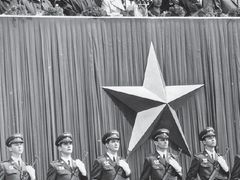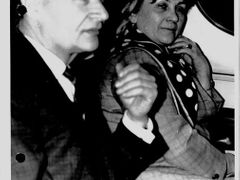Bratislava - How to approach the communist part of Czechoslovakia's history will always be a divisive issue.
A plaque honoring former Czechoslovakia's communist president Gustav Husák is exactly the kind of matter that divides the inhabitants of Bratislava, the capital of Slovakia.
Who else than the Communist Party of Slovakia proposed to honor Gustav Husák, their last communist president by presenting a plaque. First, they planned to erect the plaque last year to commemorate his 95th birthday at his native house in Dúbravka or the Dúbravka town hall building. But there were strong voices against the plaque.
According to Dúbravka mayor Ján Sandtner Husák's family rejected the plaque to be erected at their house, so the town authorities decided to unveil it in a park in Jadranská Street.
Divided they stand
As proposed by its creators, the plaque commemorates Husák's activities during the Slovak National Uprising and is expected to be presented at the end of the month of May.
Slovak right-wing parties - Christian Democratic Movement and Slovak Christian Democratic Union - voted against the plaque, while pro-government party Smer supported the project. They argued that Husák fought to preserve the historical part of Dúbravka and prevented a demolition of a local church altar.
František Mikloško, a presidential candidate, launched an online petition against the installation of the plaque. The Confederation of Political Prisoners of Slovakia and Roman Catholic Church leaders reacted with dismay at the plan.
Neither is Bratislava mayor Andrej Ďurkovský fond of the idea of honoring Husák. "Slovakia has more personalities that deserve to be honored [than Husák], he told a Slovak daily Nový čas (New Time).
Who was GH?
Gustav Husák was born on January 10, 1913 as a son of an unemployed worker. He joined the Communist Youth organization at the age of sixteen while still studying at a high school. He studied the Law Faculty at Bratislava's University of Comenius and in 1948 he joined the Communist Party, which was banned at that time.
He was constantly jailed under Jozef Tiso's government because of his communist activities. Jozef Tiso ruled Slovakia during the WWII, which was a puppet state of Nazi Germany.
In 1950 he fell victim to Stalinist purges organized by the Czechoslovak Communist party (KSČ) and ended up in prison. Following the de-stalinization of the Party his life sentence was abolished and his party membership restored in 1963.
At first he was a supporter of Alexandr Dubček's liberal party reforms but later he took a more pragmatic stand, which earned him a leadership of the Communist Party of Slovakia in August 1968 and secretary general of Communist Party of Czechoslovakia. He purged the party of its liberal members between 1969 and 1971.
Husák was elected president of Czechoslovakia in 1975 and under his leadership Prague was one of Moscow's most loyal allies. This part of history is somewhat omitted on the Bratislava plaque.









